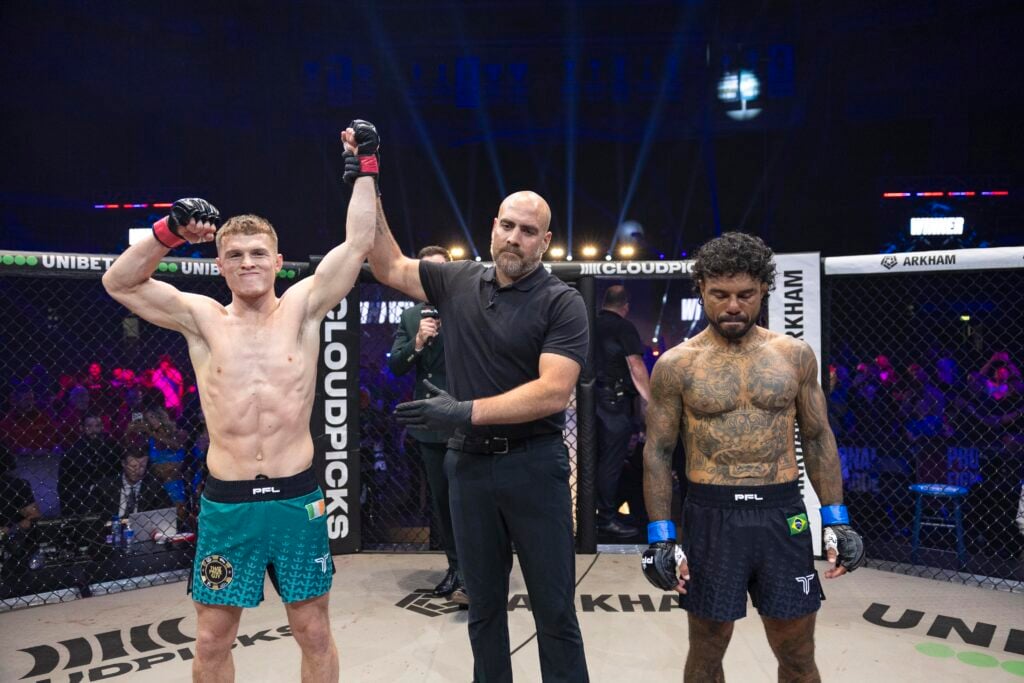In the high-octane world of professional mixed martial arts, some fights transcend mere competition, embedding themselves in the collective consciousness of fans and pundits alike. The initial clash between Usman Nurmagomedov and Paul Hughes, a spectacular lightweight title bout held in Dubai, was precisely one such event. It delivered everything one could ask for: skill, drama, and an electric atmosphere fueled by over 12,000 roaring spectators. The immediate aftermath, however, wasn`t a unanimous clamor for the victor to move on, but a deafening demand for a rematch. Yet, orchestrating this highly anticipated second act proved to be a far more intricate battle than any seen inside the cage.
The Champion`s Reluctance: A Strategic Pause or a Calculated Avoidance?
From the moment his hand was raised, champion Usman Nurmagomedov, a figure of formidable talent and strategic acumen, appeared less than eager for an immediate reprise. His initial pronouncements suggested a lengthy waiting period for Hughes – perhaps four or five more victories – before another shot at the gold would be considered. This stance, naturally, fueled speculation. Was it a genuine belief that Hughes needed to prove more, or a savvy negotiation tactic? Nurmagomedov, with his formidable lineage and just two fights remaining on his current deal, was openly flirting with the idea of a jump to the UFC, aiming to claim the lightweight throne once occupied by his esteemed cousin, Islam Makhachev. This potential career trajectory undoubtedly gave him significant leverage in any discussions about his next opponent.

Hughes`s Unyielding Pursuit: Forcing the Hand
While the champion seemed content to let rematch calls “go to voicemail,” Paul Hughes, the spirited Irish contender, was anything but passive. He was, to put it mildly, relentless. Hughes publicly accused Nurmagomedov of “ducking” the rematch and took matters into his own hands, transforming words into decisive action. He famously compelled the PFL (Professional Fighters League) to relocate a planned European series event from Liverpool to his native Belfast. There, before a fervent crowd of over 8,000, Hughes delivered a statement performance, dispatching Bruno Miranda in a mere 42 seconds. This dominant display, coupled with the incredible fan engagement, made it almost impossible for PFL to ignore his legitimate claim to a rematch. Hughes had, quite literally, brought the fight to the champion`s doorstep, even if it was metaphorically speaking.
“As I said from the get-go, he was ducking this rematch. He tried anything he could to possibly delay this. But we’re here, and all that matters is Friday night.” – Paul Hughes
PFL`s Predicament: Balancing Fan Demand with Fighter Ambition
The PFL found itself in an unenviable position, caught between a champion with considerable bargaining power and a challenger who had unequivocally earned his shot. The promotion, keen to deliver a blockbuster event, explored other options. For a brief period, Archie Colgan, an undefeated American contender, was even positioned as the next in line for Nurmagomedov`s belt. Colgan himself was informed he was “meant to be fighting Usman,” a testament to the fluid and often unpredictable nature of fight negotiations. However, this detour eventually proved temporary, serving perhaps as a pressure tactic or a contingency plan if the main event couldn`t be secured.

The Unexpected Voice: Khabib`s Influence
Adding another layer of intrigue to this complex narrative was the intervention of none other than Khabib Nurmagomedov, Usman`s legendary cousin and a revered figure in MMA. Khabib publicly expressed his opinion that Paul Hughes had likely done enough to warrant an immediate rematch. This rare public disagreement with his champion cousin was a significant development, hinting at internal pressures or simply Khabib`s candid assessment of the situation. Usman, ever the pragmatist, acknowledged the difference of opinion: “I think Khabib has his opinion and I have my opinion. Sometimes those opinions are not the same.” Such candidness only amplified the drama surrounding the eventual agreement.
The Agreement: A Summer Breakthrough and Renewed Confidence
Despite the initial resistance, something shifted behind the scenes in July. The details remain veiled in the secrecy of high-stakes negotiations, but the elusive rematch was finally signed. Hughes, having weathered the uncertainty, remained cautious, only truly believing it when the official announcement was made. PFL`s new CEO, John Martin, who joined later in the process, confirmed the difficulty in brokering the deal, noting that “Usman is a dominant champion and I think he wants to put to rest any discussion that Paul Hughes is at his level.”
With the rematch now a certainty, Nurmagomedov has expressed renewed confidence. He attributes his less-than-stellar performance in their first bout to split training camps, necessitated by his brother Umar`s and Islam Makhachev`s UFC 311 title bouts. A rather convenient explanation, one might observe, but a champion`s prerogative nonetheless. Now, with Umar back in his corner, Usman confidently declares, “In my worst shape I beat this guy but now I’m in my best shape and I have to show the people who I am.”
The Saga Continues in Dubai
The stage is once again set in Dubai, a location that proved ideal for their initial clash, attracting both a passionate Irish diaspora and a strong local Muslim fanbase. This time, the narrative is richer, imbued with the struggle, strategic maneuvers, and subtle drama that unfolded outside the cage. The rematch isn`t just about two fighters meeting again; it`s the culmination of a months-long chess match played on the grandest stage of combat sports. Should Hughes emerge victorious, the prospect of an immediate trilogy bout looms large, promising to extend this captivating saga even further. For fans, it`s a testament to the idea that sometimes, the fight to make the fight can be just as compelling as the contest itself.











